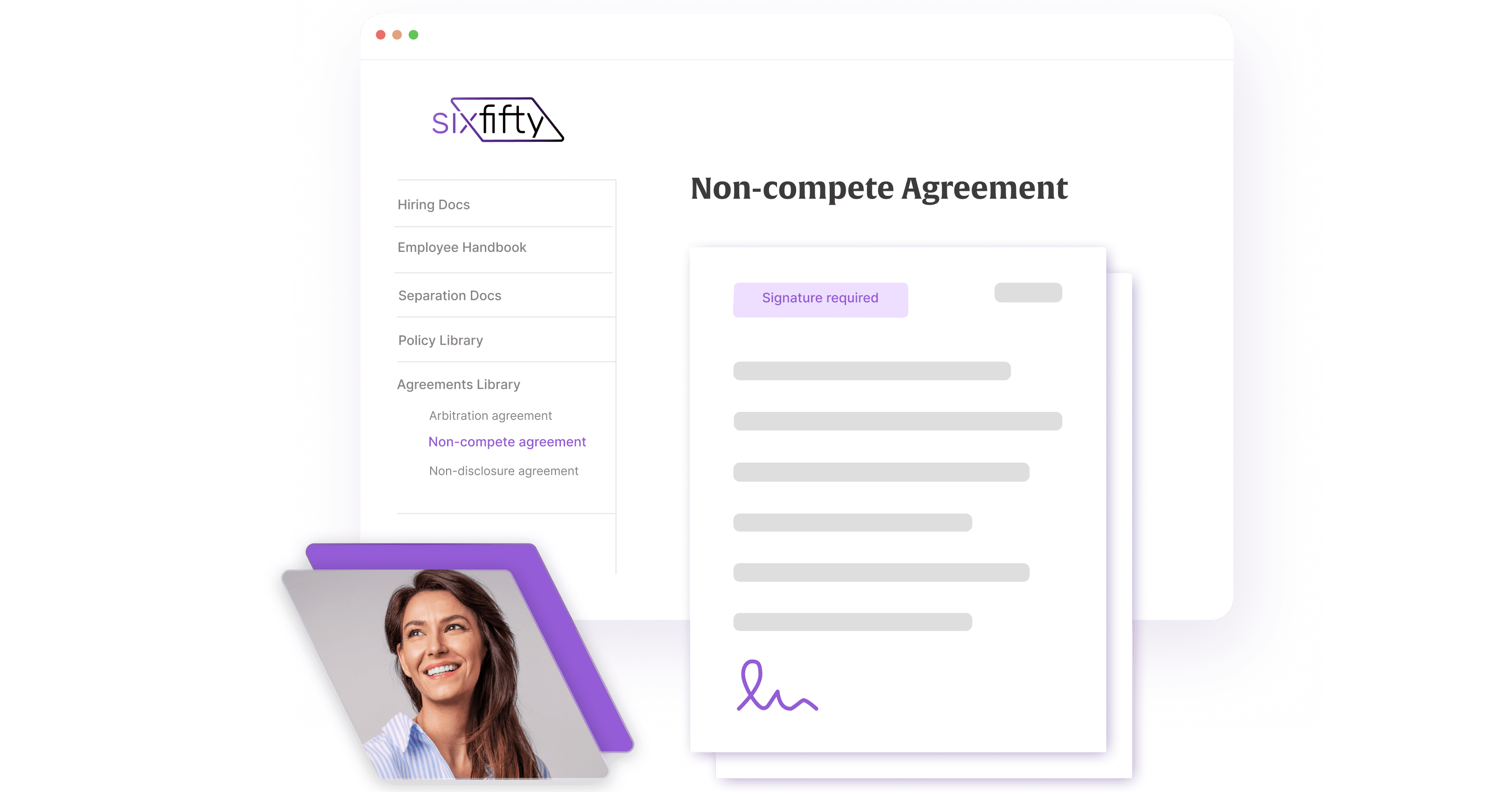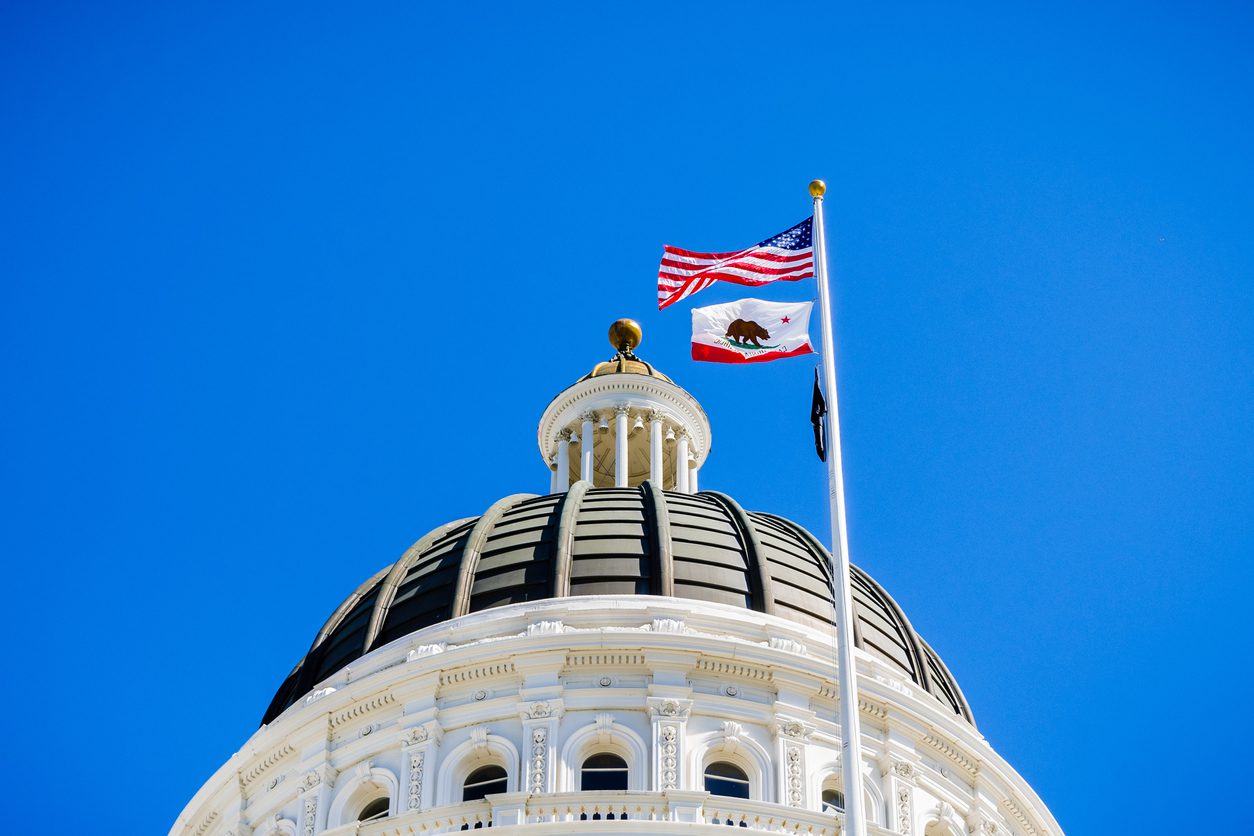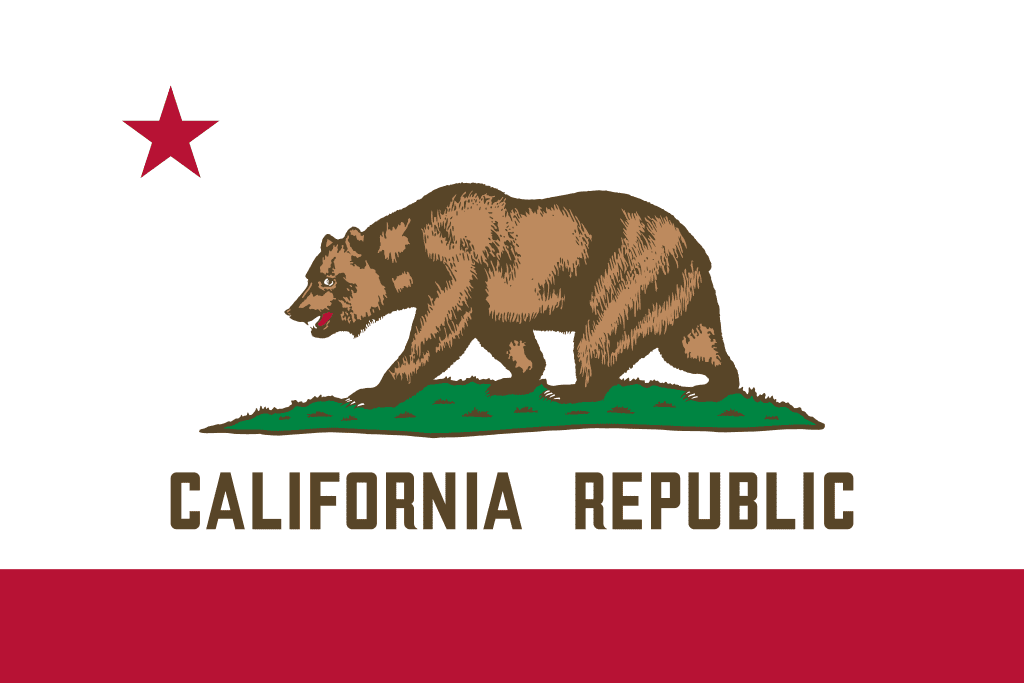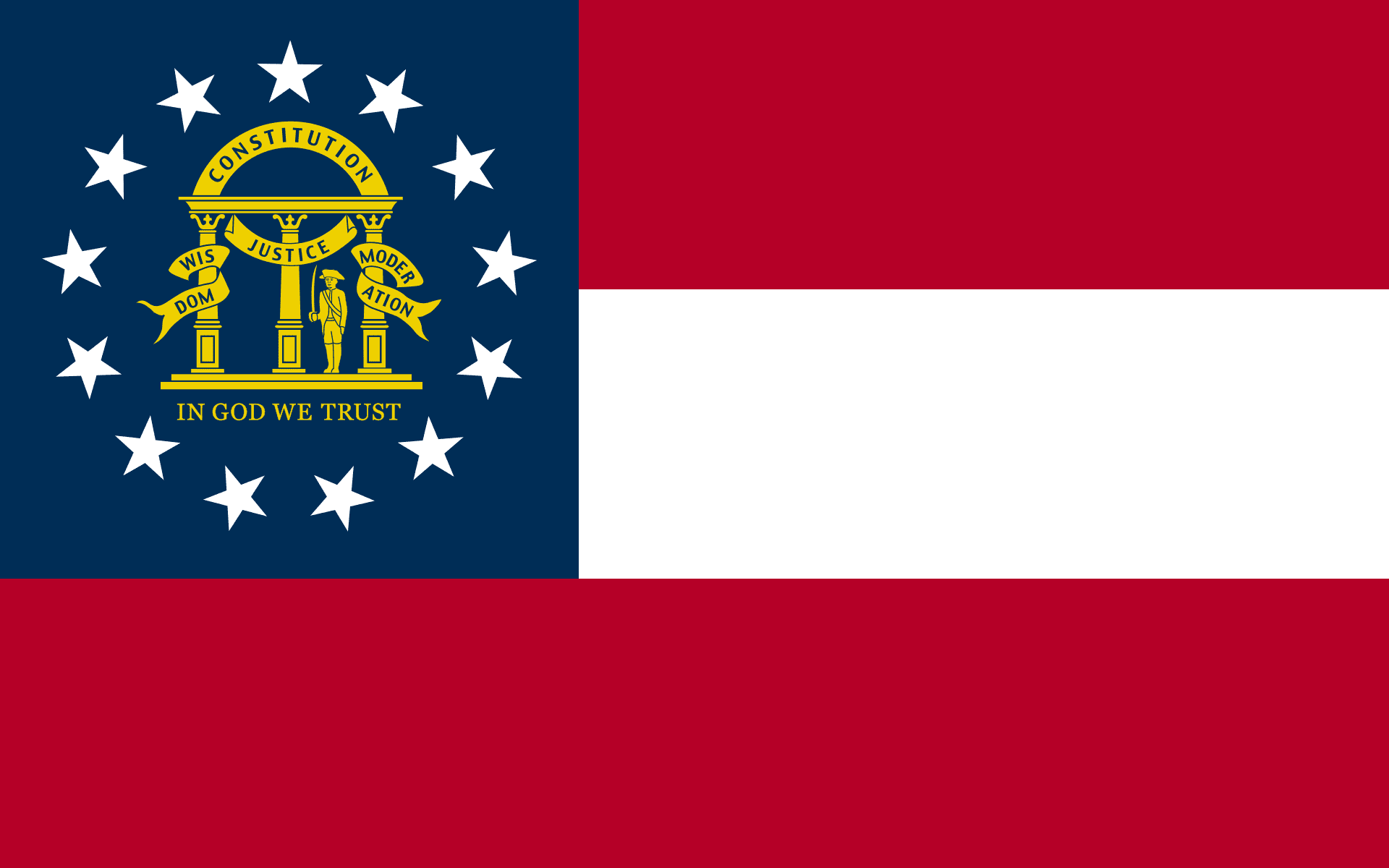
Curious about non-compete agreements?
We can help you navigate changes and bans for state-specific non-compete agreements with a SixFifty Employment Docs subscription. We update our document engine as the laws change so you always have the latest legal language at your fingertips.
Latest news on non-compete agreements
We are continually updating and expanding the SixFifty Employment Docs platform to reflect the latest federal and state law requirements and emerging best practices. See a snippet of our latest updates below.
Q3 2024
For more information on these updates login to your SixFifty account or request a demo of our Employment Docs tool to create state-specific non-compete agreements any time.
Update: FTC’s Non-Compete Ban Is Halted Nationwide
On April 23, 2024, the Federal Trade Commission (“FTC”) issued a final Rule—effective September 4, 2024—banning non-compete agreements nationwide and requiring employers to provide notice of the Rule to current and former employees.
Four lawsuits were quickly filed challenging the Rule. Until now, those lawsuits had given mixed and confusing signals about whether employers would need to comply with the Rule by September 4.
That changed on August 20, 2024, when a Texas federal court in Ryan, LLC v. FTC found that the Rule was unlawful and said the FTC can’t enforce the Rule anywhere in the nation.
Of course, this ruling is likely to be appealed, but in the meantime the court’s ruling gives employers some much needed certainty. Here’s what you need to know about this update to the nationwide non-compete ban:
What was the final result in Ryan, LLC v. Federal Trade Commission?
Originally, the judge in the Ryan case committed to issuing a final ruling on the merits of the case by August 30 so that employers would have an answer before the Rule’s effective date.
She beat her own deadline by 10 days when she decided on August 20 that “the FTC exceeded its statutory authority in implementing the Rule, and the Rule is arbitrary and capricious.” As a result, the judge found that the Rule “shall not be enforced or otherwise take effect on its effective date of September 4, 2024, or thereafter.”
This ruling applies nationwide, so no employer needs to comply with the Rule. This could change if the ruling is reversed on appeal, but the result of any appeal could be far in the future.
Ultimately, this could be a case that reaches the Supreme Court, especially since we’ve seen lower courts come to different conclusions on the legality of the Rule.
What should employers do now about non-competes?
With this non-compete ban update, employers can rest easy knowing that the existing non-compete framework is no longer under immediate threat at the federal level.
But states continue to regulate non-competes aggressively, so employers need to follow the non-compete law of every state where they have employees.
So the non-compete ban is dead for now, but employers should stay alert for any change in this non-compete spectacle since an appellate court could easily bring it back.
We are monitoring developments surrounding this rule and will update our tools and inform our customers accordingly.
Special Update: FTC Bans Non-Compete Agreements Nationwide
On April 23, 2024, the FTC issued a final rule (see pages 561-568) banning non-competes for employees nationwide. The FTC estimates this decision will affect around one fifth of the U.S. workforce, or 30 million people.
The rule will go into effect 120 days after its publication in the Federal Register. Publication is scheduled to occur on May 7, 2024, making the effective date September 4, 2024. Several lawsuits have already been filed challenging the new rule and its future is uncertain. Our in-house Legal Product team at SixFifty expects non-compete law to be in flux for the foreseeable future.
Regardless, employers should prepare to comply with the rule by the effective date, and you may be left having to comply with the current patchwork of state non-compete laws if the rule is delayed during litigation or ultimately found invalid.
Here’s what you need to know about the non-compete ban:
The basics of the final rule
This rule completely shifts the non-compete landscape in the U.S. and institutes a nearly categorical ban. Going forward, all post-employment non-competes are banned unless they’re executed in conjunction with the sale of a business. The rule also applies retroactively, banning all existing non-competes. Note that only the non-compete provision will be voided, not the entire agreement.
It’s hard to overstate what a radical departure this is from existing law. On their own, states have been regulating non-competes with increasing frequency, but this rule goes much further than most states have dared.
The scope of the nationwide ban
This new rule is strikingly broad in scope. Going forward, it applies to nearly all workers equally; the Pfizer CEO and the Walgreens pharmacy tech are treated identically.
The rule also goes further than banning traditional non-compete agreements: It expands the definition of a “non-compete” to other types of restrictive covenants that are written broadly enough that they function as non-competes. In other words, it bans any term or condition of employment that prohibits, penalizes, or prevents a worker from:
-
seeking or accepting other post-employment work in the U.S., or
-
operating a business in the U.S. after the conclusion of employment.
This prohibition could apply to non-solicitation agreements, no-poach agreements, and even some non-disclosure agreements. Our employment law team will be monitoring how the FTC enforces the rule and how courts interpret this ambiguous definition of “non-compete.”
Retroactivity and notice requirements
Further, this new rule applies both prospectively and retroactively, meaning that any offensive agreement currently in existence or signed going forward is unenforceable, with one exception: Non-competes already executed with senior executives are not voided and will be permitted to run their course.
Senior executives are those who are in a policy-making position and received compensation of:
-
At least $151,164 in the preceding year, or
-
At least $151,164 when annualized, if the worker was employed during only part of the preceding year,
-
At least $151,164 when annualized in the preceding year prior to the worker’s departure, if the worker departed from employment prior to the preceding year and the worker is subject to a non-compete clause
Under this rule, employers who already executed non-competes with their employees are required to rescind those agreements within 120 days of the publication of the rule in the Federal Register. Employers must also provide “clear and conspicuous notice” to the employee or ex-employee by the rule’s effective date that their non-compete clause will not be, and cannot legally be, enforced against them.
This notice must be delivered to the affected worker either in person, by mail at their last known personal street address, or by email (including the worker’s current work email address or last known personal email address), or by text.
Preemption of state law
Finally, this federal rule expressly preempts any state law that doesn’t provide protections at least as significant as those it provides. If a state provides more or stronger protections, those provisions will be honored.
Next steps for employers and HR leaders
For employers who have ever used non-compete agreements, the first step is to entirely discontinue your use of non-compete agreements going forward (though you don’t need to do this quite yet; you still have 120 days from the date of publication). This will likely require you to review any form agreements you have and check whether they contain non-compete provisions or other restrictive covenant clauses that need to be narrowed or removed. You may also want to take advantage of this time to review and implement any other ways you might be able to protect your trade secrets, like installing data protection software, executing other protective agreements like NDAs, or developing and administering trade secret and data security training. The Sedona Conference’s Commentary on Protecting Trade Secrets Throughout The Employment Life Cycle and
the Beck Reed Riden Primer and Checklist for Protecting Trade Secrets andOther Legitimate Business Interests are two helpful resources to help you think through your options.
Next, you will need to determine whether you need to rescind any existing non-compete agreements you have and to send notice to affected employees or ex-employees of the rescission. If you would like to maintain your non-competes where possible, you will need to determine whether any of your employees who are subject to a non-compete satisfy the “senior executive” definition; those are the only employees whose non-competes aren’t automatically voided. You still are prohibited from executing new non-competes with them, though.
Finally, you should keep your eye on any legal updates about this new rule, as it is certain to be challenged in court. The U.S. Chamber of Commerce has already committed to challenging this rule, and there are unquestionably more to follow suit.
Q1 2024
For more information on these updates login to your SixFifty account or request a demo of our Employment Docs tool to create state-specific non-compete agreements any time.
Overview

By: D’Mia Lamar, Legal Product Associate at SixFifty
Non-compete agreements have long been a contentious issue in employment law, and the debate surrounding their regulation continues to intensify. With businesses seeking to safeguard their intellectual property and employees advocating for their labor mobility, the landscape of non-compete legislation remains in flux. As debates grow, states across the U.S. continue to push their own legislation, reshaping the non-compete landscape each time. So far this year, over 70 non-compete bills have been proposed across more than half of the states. There has also been movement at the federal level, the most prominent being the FTC’s proposed rule banning non-competes nationwide, with a final rule to be released later this year. For now, let’s delve into some of the new non-compete regulations at the state level.
Three States to Watch:
Illinois
Illinois is considering HB 5385, which would replace its 2022 non-compete law overhaul with a complete ban. Following California’s lead, this bill would void non-competes with all current employees and some former employees, regardless of where they were signed or maintained. Once again echoing California, the bill introduces individualized notice requirements to ensure that affected employees and ex-employees who were employed after January 1, 2023, are informed that their non-competes are void.
Maine
Maine’s HB 1496 is sitting at the one-yard line, awaiting the Governor’s signature. This bill would replace the state’s previous wage threshold restriction with a complete ban on non-compete agreements with Maine residents. The bill would also require employers to post and maintain a notice of the ban and impose a $5,000 minimum fine for employers who require or permit their employees to sign a non-compete. Luckily, for employers, this ban would only apply to agreements made after the bill’s effective date, leaving any non-competes executed before that date unaffected.
Washington
Signed by Governor Inslee on March 13, 2024, Senate Bill 5935 expands the definition of non-competition covenants and limits the use of non-solicitation agreements to only those that prohibit employees from soliciting business from current customers. Any non-solicitation agreement that prohibits employees from soliciting business from past or future customers or from accepting business from current customers is considered a void non-competition agreement. This bill also invalidates any provision in a non-compete that applies laws from jurisdictions outside of Washington. This provision aims to prevent employers from circumventing Washington’s stricter non-compete laws by opting for the laws of states with more lenient regulations.
Q2 2023
For more information on these updates login to your SixFifty account or request a demo of our Employment Docs tool to create state-specific non-compete agreements any time.
Overview

By: Adam Wright, General Counsel and VP of Legal Product, SixFifty
Both the federal and state governments continued the assault on non-compete agreements. Minnesota became the fourth state to completely ban non-compete agreements with employees. On July 1, 2023, Minnesota will join California, North Dakota, and Oklahoma in the small (but growing) group of states that impose a full ban. Minnesota’s law is the first total non-compete ban since Oklahoma banned them in 1890, more than 130 years ago! Hot on the heels of Minnesota, the New York State Assembly passed a non-compete ban on June 20, 2023. That bill is headed to Governor Hochul’s desk, which she is expected to sign. We’ll briefly dive into the details of these new laws.
Minnesota
Minnesota’s law applies to both employees and independent contractors and provides that “[a]ny covenant not to compete contained in a contract or agreement is void and unenforceable.” The law also makes sure that employers can’t get around the ban by providing that another state’s law will govern the non-compete. If the employee “primarily works and resides in Minnesota,” then Minnesota law must govern and any dispute must be heard in Minnesota courts. Notably, the ban doesn’t apply to nondisclosure agreements, non-solicitation agreements, “agreement[s] designed to protect trade secrets or confidential information,” or “agreement[s] restricting the ability to use client or contact lists, or solicit customers of the employer.“ The law does allow for the use of non-competes used in connection with a sale of business. Employers will be relieved to know the law is not retroactive, so non-competes entered prior to July 1, 2023 are not affected.
New York
New York’s law, if signed by the governor, would take effect 30 days after her signature. Like the Minnesota ban, the law is not retroactive, so it doesn’t affect non-competes signed before the effective date. The law also doesn’t apply to an agreement that “prohibits disclosure of trade secrets, disclosure of confidential and proprietary client information, or solicitation of clients of the employer that the [employee] learned about during employment” (i.e., nondisclosure and customer non-solicitation agreements). Unlike the Minnesota ban, the New York law has no exception for non-competes entered in connection with the sale of a business. The law leaves a lot of questions unanswered. For example, it’s unclear whether the law bans employee non-solicitation provisions which prevent departing employees from encouraging others to leave with them. If the law is enacted, we are likely in for years of litigation to determine the contours of the law.
Federal
At the federal level, we continue to monitor the FTC’s proposed non-compete ban, which would ban employee non-competes nationwide. Bloomberg News recently reported that the FTC will not vote on the final version of the rule until April 2024, after the agency received almost 27,000 comments on the draft rule. While the rulemaking process continues, the FTC continues to bring enforcement actions against companies’ unfair use of non-competes. Businesses should be aware that overzealous use of non-competes comes with a real risk, even absent a federal rule banning them.
NLRB
The National Labor Relations Board (NLRB), a different federal agency, was not content to wait for the FTC’s final rule. On May 30, 2023, NLRB General Counsel Jennifer Abruzzo issued a memo saying that employers’ use of non-competes violates the National Labor Relations Act (NLRA). She argued that non-compete provisions violate the NLRA because they “could reasonably be construed by employees to deny them the ability to quit or change jobs by cutting off their access to other employment opportunities that they are qualified for based on their experience, aptitudes, and preferences as to type and location of work.” Although this opinion isn’t a rule, it is effective immediately, and indicates the NLRB will increase its scrutiny of non-compete agreements, especially those with low- or middle-wage workers. Importantly, Ms. Abruzzo’s opinion will not affect non-competes with supervisory or managerial employees because they aren’t protected under the NLRA.
Apart from these monumental changes in non-compete law, we’re still monitoring 88 non-compete bills that are pending in 33 states. Stay tuned, as there will certainly be more updates coming in this area of the law.
Explore more resources on non-competes
Browse our latest articles on non-compete agreements or create your own with an Employment Docs subscription.












